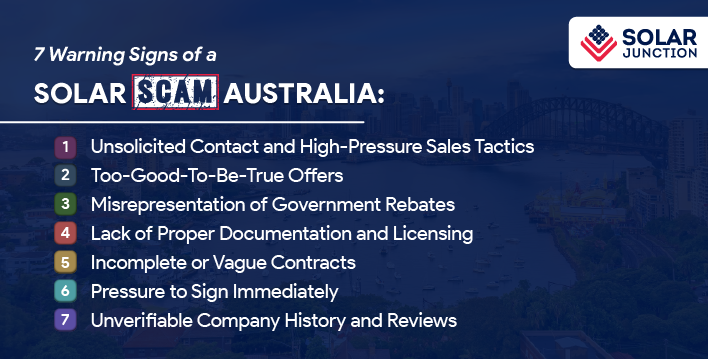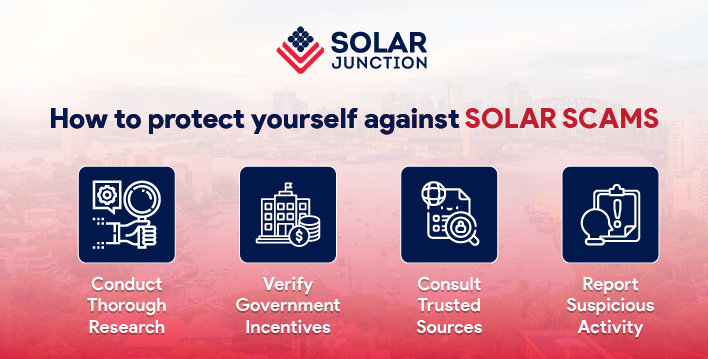Solar Scams Australia: 7 Red Flags Every Homeowner Should Know
HOME > Solar Scams Australia: 7 Red Flags Every Homeowner Should Know

As solar energy gains popularity across Australia, homeowners are increasingly targeted by fraudulent schemes. Understanding the warning signs of solar scams Australia is crucial to protect your investment and ensure a legitimate transition to renewable energy.
This guide outlines seven red flags to watch for and provides insights to help you navigate the solar market safely.
Be cautious of unexpected phone calls, or emails, promoting solar products or services. Scammers often use aggressive tactics to pressure homeowners into quick decisions without proper research.
Legitimate companies respect your decision-making process and provide ample time to consider your options.
Offers that promise extremely low prices, guaranteed returns, or "free" solar panels are often misleading. While government incentives exist, they don't cover the entire cost of a solar system.
Scammers may use these tactics to lure you into agreements that result in subpar installations or hidden costs.

Scammers might falsely claim affiliation with government programs to gain your trust. For instance, solar rebate scam calls have been reported where callers pretend to represent official schemes. Always verify such claims by contacting the relevant government department directly.
Ensure that any solar installer you consider is properly licensed and provides comprehensive documentation. Failure to provide proof of accreditation or reluctance to share contract details is a significant red flag.
A legitimate solar provider will offer a clear, detailed contract outlining the scope of work, costs, timelines, and warranty information. Be wary of contracts that are ambiguous or lack essential details, as they may be indicative of solar panel scams Australia.
Solar scams Australia often create a false sense of urgency, insisting that you must sign a contract immediately to secure a special deal. This tactic prevents you from conducting due diligence. A reputable company will allow you the time needed to make an informed decision.
Before committing to a solar provider, research their history and customer reviews. A legitimate company will have a track record of satisfied customers and verifiable references. Be cautious if you find limited or negative feedback, as this could indicate solar fraud.

To safeguard against these scams:
One of the increasingly common tactics in solar scams Australia is the use of unsolicited solar door-to-door scams. Scammers may pose as representatives from well-known solar companies or government programs, claiming to offer “free installations” or “exclusive discounts” if you sign up immediately.
These individuals often lack credentials and pressure homeowners to sign contracts or pay deposits on the spot.
A legitimate solar provider will never demand immediate decisions at your doorstep—always ask for identification, take your time to research, and never provide payment or personal information without verifying their credentials.
Fraudsters are also targeting homeowners with solar rebate scam calls, pretending to be from government agencies or trusted energy retailers.
They often promise generous rebates or refunds in exchange for personal details or upfront payments. These scams exploit public awareness of real incentive programs, making them harder to detect.
If you receive a call claiming you're eligible for a rebate or urgent incentive, hang up and contact the relevant government body directly. Remember, no official body will request sensitive information or payments over the phone without prior verification.
Some scams come disguised as too-good-to-be-true offers, often labelled as limited-time promotions or heavily discounted systems.
These misleading solar deals are designed to catch the attention of budget-conscious homeowners but often result in solar panel fraud—such as poor-quality panels, missing warranties, or systems that underperform.
In other cases, they may involve solar installation fraud, where the installation is carried out by unlicensed workers or is never completed at all.
Protect yourself by comparing multiple quotes, checking provider reviews, and verifying all equipment and installer accreditations through the Solar Accreditation Australia (SAA).

A more subtle yet deceptive tactic used in solar scams Australia involves manipulating pricing or falsifying comparisons to make their offer appear superior.
Some scammers present fabricated solar quote comparison sheets, showing inflated prices from other providers to make their own seem like the best deal.
Others may omit key components, such as inverters or warranties, from their quote—only to charge extra later.
Always request detailed, itemised quotes and take time to compare them with those from verified, reputable companies. Transparency and clarity are hallmarks of legitimate solar providers.
Want to make sure you're getting a fair deal? contact us for honest advice.
While there are incentives and rebates, they typically don't cover the full cost of a solar system. Be cautious of claims offering entirely free installations.
Do not provide personal information. Instead, contact the relevant government department directly to verify the legitimacy of the claim.
If you suspect of any scams, report it to your local consumer protection agency or the Australian Competition and Consumer Commission (ACCC).
Unsolicited contact, requests for personal information, high-pressure tactics, and claims of limited-time offers are common indicators.

Higher rebates available
only until 30 April 2026
